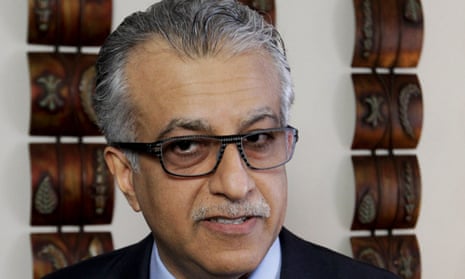Bahraini pro-democracy campaigners have written to Fifa’s top sponsors to raise concerns over Sheikh Salman al-Khalifa’s attempt to become the president of world football’s governing body.
The Asian Football Confederation president has emerged as the favourite to take over from Sepp Blatter at February’s election but the Bahrain Institute for Rights and Democracy insists he still has questions to answer over his alleged role in punishing clubs after the 2011 pro-democracy uprising in the country.
Sheikh Salman has admitted he was asked to head a fact-finding committee to examine the role of footballers and athletes in the uprising, as reported by the state news service, but has said the committee was never formally constituted.
In the letter to Coca-Cola, McDonald’s, Visa, Adidas, Budweiser, Gazprom and Kia, the BIRD also claims the Bahrain Football Association, of which Sheikh Salman was president at the time, suspended and punished six clubs on politically motivated grounds.
“We hope Fifa’s sponsors consider our letter very seriously and respond immediately and appropriately,” said Sayed Ahmed Alwadaei of BIRD. “Sheikh Salman led the politicised punishment of clubs and denies the torture Bahraini players underwent. Coca-Cola have called for an accountable Fifa. What happened in Bahrain was a black mark on its history and Sheikh Salman must be held accountable for the part he played.”
In a letter, seen by the Guardian, the six clubs wrote to the BFA asking for their matches to be suspended on safety grounds given the security situation in the country. They were later fined and two were relegated.
A report on the Bahrain state news agency website in April 2011 said the BFA administrative council “stressed the importance of working in accordance to the commission of inquiry’s decisions concerning all those who have offended our leadership and our precious Kingdom, and to work on excluding all those whose participation [in the events] have been proven including administrators, referees and members of the working committees of BFA.”
Sheikh Salman, who became president of the Asian Football Confederation in 2013 with the support of Blatter, decided to stand for the Fifa presidency after the banned Uefa president Michel Platini was forced to withdraw from the race.
The other contenders for the Fifa presidency are the former Fifa vice-president Prince Ali bin al-Hussein of Jordan, the former Fifa executive Jérôme Champagne, the South African former anti-apartheid campaigner and businessman Tokyo Sexwale and Uefa’s general secretary, Gianni Infantino.
After years of resisting calls to put pressure on Fifa over corruption allegations, the wave of arrests in May last year and a US indictment that accompanied allegations of a “World Cup of fraud” prompted a strong reaction from Fifa’s corporate backers.
Fifa has admitted the corruption crisis has damaged its finances, with new sponsors reluctant to be linked with Fifa and fees for lawyers and consultants spiralling.
Sponsors including Coca-Cola and McDonald’s in June called for an external reform process and a larger cohort later wrote to Fifa demanding that Blatter stand down immediately rather than hanging on until February.
Blatter was later suspended over a £1.3m “disloyal payment” to Platini and banned from football for eight years.
Human Rights Watch’s Gulf researcher Nicholas McGeehan said: “At a time when Fifa is going through the biggest crisis in its history it would seem like an act of institutional suicide for it to appoint as its leader a man who was apparently responsible for sanctioning clubs who failed to show loyalty to a murderous regime.”
Sheikh Salman has consistently rejected claims that he was involved in identifying players involved in the protests who were later imprisoned and, in some cases, tortured.
Associated Press reported in 2011 that more than 150 athletes, coaches and referees were jailed after being identified from photos of protests.
“The allegations are entirely false and categorically denied by Sheikh Salman bin Ebrahim al-Khalifa,” said a statement issued through the London law firm Schillings to the Guardian last year. “While it was proposed that Sheikh Salman lead a fact-finding committee in relation to the events of 2011, that committee was never formally established and never conducted any business whatsoever.
“For the record, and in light of the recycling of historic allegations in the media, Sheikh Salman had absolutely no involvement in the identification, investigation, prosecution or mistreatment of any individuals as has been alleged.”
Sheikh Salman said this week: “When people talk about skeletons in the closet, my closet is clear. Some people have an agenda but it’s a waste of time trying to answer them and I think it has already been done by the proper bodies within Fifa and the AFC. There has been an integrity check and I don’t have anything to defend myself about.”
